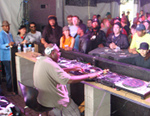Feature
Time Out Chicago
April 2005

“Sometimes, I feel like the invisible man of Detroit techno,” says Anthony “Shake” Shakir. Being in the right place and being connected can make all the difference. But sometimes, even those big breaks aren’t enough.
Working during the ’80s in the studio of dance music icon Derrick May (who was appropriately nicknamed the Innovator), Shakir was definitely in the mythical right-place-at-the-right-time. Shakir, a techno producer and DJ, also has ties to nearly every big name in Detroit techno, but things have hardly worked out like a dream. To most of techno’s American fans, he doesn’t exist. In fact, his Sonotheque gig on Friday at the Going Forward in Reverse night will be his Chicago debut.
Born in Detroit in 1966, Shakir, a self-described shy child, was never comfortable in crowds. But he always found solace in music. “I ave pictures of myself playing with records when I was two,” he says. “I’ve been listening to records all my life.” A fan of an eclectic array of sounds from Thomas Dolby to Parliament, Shakir was drawn to radio mix shows as a kid. He learned the basics of deejaying in high school by messing around with a friend’s turntables and mixer. While studying communications at Western Michigan University form ’84 to ’89, he occupied himself with record collecting and playing frat parties.
It was during a trip home from college in 1986 that Shake started hanging out with DJs and producers who went on to define Detroit techno — the futuristic, stripped-down spin-off of house that’s been so influential in dance and electronic music. Shake bumped into then unknown techno legends Juan Atkins and Derrick May one night and found a common bond in dance music. Soon he was hanging out at May’s Metroplex studios learning how to make his own records, doing odd jobs recording local rap groups, even crashing on the floor just to be in the studio. He jokes that at that time, he was nothing more than a studio janitor.
But things just didn’t click. Though he landed a track, “Sequence 10,” under his name on the famous 1988 Virgin Records U.K. compilation Techno! The New Dance Sound of Detroit and released his own records, like 1992’s 5% Solution on Metroplex, his career remained grounded.
“The golden age of Detroit techno was between 1988 and 1992,” Shakir says. “I didn’t really feel confident in myself until 1996… everybody’s always a day late and a dollar short. I didn’t realize I could be doing it all along. I was to stubborn, waiting for someone to say I was good.”
Shakir’s confidence finally got a boost when another friend, DJ and producer Claude Young, took an interest in his work. Young spun Shakir’s “That’s What I Want” on his WHYT radio show and helped him get gigs in Europe. Invigorated, Shakir launched the Frictional label with Young in 1995, on which he released more than a half-dozen singles in the late ’90s.
In 2000, just as things were starting to go his way, more challenges unfolded. A planned solo album was shelved after German label EFA went bankrupt. And in June of that year, Shakir was diagnosed with MS. “I was just walking with a friend and felt this weird tugging on my leg. I didn’t know what was going on, and then I fell.”
Since then, he’s been living with his mom in Detroit, just down the block from where he grew up, and finishing the solo album (slated for release on Frictional) in his makeshift home studio. Shakir’s condition has changed things. “It affects my balance, so I walk with a cane. I need a chair to get around,” he says. As for music, it hasn’t had much of an effect (he does most of his production on a computer these days) except that Shakir now performs his DJ sets seated on a stool.
Recently, Shakir has gotten more recognition. He was a guest at the 2003 All Tomorrow’s Parties festival curated by Autechre and his “Ghetto Future” appears on the festival comp and record set. This year, he even managed an eight-day European tour.
Shakir may lack the name recognition of other Motor City DJs, but he’s happy to be an entry in the book of Detroit techno. “I can’t walk down the street,” he says, “but man, I’m still alive. I have a lot to be thankful about.”
photo: